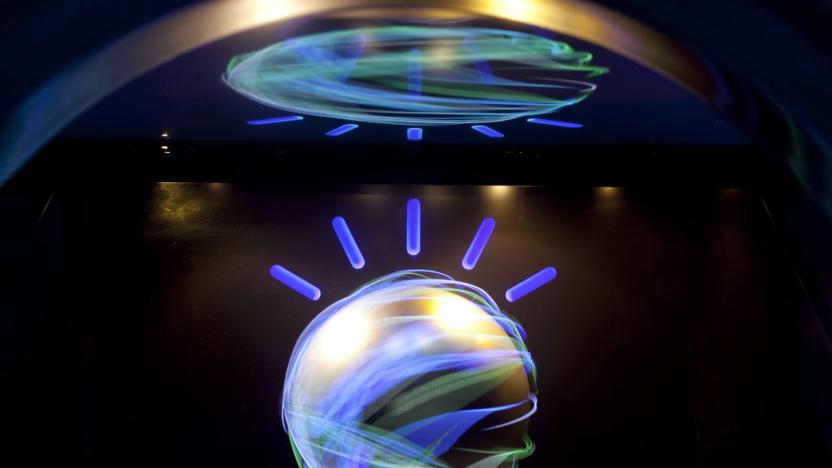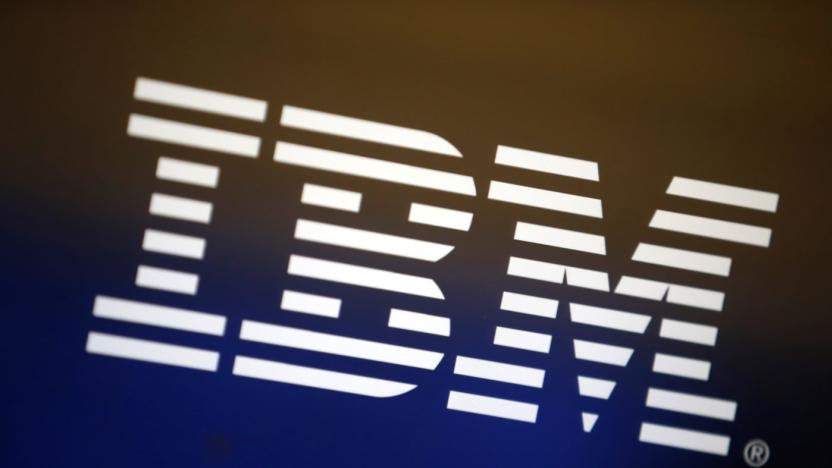IBM
Latest

Samsung plugs IBM's brain-imitating chip into an advanced sensor
IBM's TrueNorth, a so-called "cognitive chip," remarkably resembles the human brain: its 4,096 cores combine to create about a million digital neurons and 256 million synapse connections. In short, like everyone's favorite complex organ, it operates extremely quickly and consumes far less energy than typical processors. Samsung has taken the chip and plugged it into its Dynamic Vision Sensor (DVS) to process digital imagery at a blindingly fast rate.

The Engadget Podcast returns!
In 2014 we said the Engadget Podcast was going on hiatus to "retool." Well, we haven't been sitting on our laurels. Over the last two years we've rethought our editorial mission, completely redesigned the website and, now, we're launching a new and improved podcast.

A bus suspended over the ground, and more in the week that was
So far Tesla has launched a sexy sportscar, a luxe sedan, a powerful SUV, and an affordable electric car. What's next? Think bigger. According to Elon Musk, the company is set to unveil an electric Minibus next year, and it will drive itself. Speaking of buses, China just unveiled the craziest one we've ever seen: It's suspended above the ground, and is tall enough to fly right over traffic jams. A team of students created the world's most efficient electric car, which gets an outrageous 26,135 MPGe. Gogoro launched a new electric scooter sharing service in Berlin, and the world's first Hyperloop factory opened for business.

IBM's Watson AI saved a woman from leukemia
IBM's Watson has done everything from winning at Jeopardy to cooking exotic meals, but it appears to have accomplished its greatest feat yet: saving a life. University of Tokyo doctors report that the artificial intelligence diagnosed a 60-year-old woman's rare form of leukemia that had been incorrectly identified months earlier. The analytical machine took just 10 minutes to compare the patient's genetic changes with a database of 20 million cancer research papers, delivering an accurate diagnosis and leading to proper treatment that had proven elusive. Watson has also identified another rare form of leukemia in another patient, the university says.

IBM researcher builds a phase-change capable artificial neuron
Computers have long been compared to artificial brains, but now IBM has followed the comparison and built a working artificial neuron. The tech giant's research center in Zurich created 500 of them to simulate a signal transfer similar to how the process works in an organic brain.

IBM's new virus filter could lead to home diagnostic tools
The best way to treat any disease, beyond avoiding getting sick in the first place, is to catch it early. You can always go to the hospital and have expensive tests run, but we can do better: New research from IBM could lead to lab-on-a-chip virus detection technology that would enable let patients monitor their health by analyzing saliva or urine samples at home.

IBM and Gogo join forces to dodge in-flight turbulence
In what might seem like an unlikely partnership, IBM's Watson division and Gogo Inc. (the people who bring you in-flight WiFi) have joined up to make flying a little bit smoother for everyone. As the Wall Street Journal reports, IBM is leveraging its $2 billion purchase of The Weather Company and Gogo's internet connection to give airline pilots a heads up on turbulence.

Olli is an IBM Watson-powered driverless electric bus
You might see a cute, driverless bus roaming the streets of Washington DC starting today. It's called Olli, and it's an autonomous electric minibus designed by Local Motors, which you might remember as the company that's planning to sell 3D-printed cars this year. While the automaker itself designed the 12-seater's self-driving system, it teamed up with IBM to use Watson's capabilities to power the EV's other features. Thanks to Watson, you can tell Olli where you're heading in natural language ("I'd like to go to [workplace.]") and ask it questions about how the technology works. Best of all, it won't kick you out even if you keep asking "Are we there yet?"

IBM's AI can predict how we'll react to the weather
According to the "butterfly effect" theory, weather is inherently hard to predict. But IBM thinks that if you throw even more computing smarts and data at it, you should be able to at least improve forecasts. Big Blue is marrying its own hyper-local weather models with global ones from (its own) The Weather Company and creating Deep Thunder, the best-named forecasting system ever. To analyze all the data, the company is building new deep-learning algorithms and training them using petabytes of historical data.

Former IBM employee accused of economic espionage
A former IBM software engineer working in China has been charged with six counts of economic espionage and theft of trade secrets, Reuters reports today. The employee, 30-year-old Xu Jiaqiang, is accused of using his access as a developer to steal and subsequently sell IBM's proprietary source code.

IBM's optical storage is 50 times faster than flash
Flash storage is too slow for your device's main memory, but RAM is expensive and volatile. Thanks to a breakthrough from IBM, phase-change memory (PCM) might one day replace them both. The crystal-based storage has been used in optical disks and other tech for at least 15 years, but the technology has been limited by the cost and storage density -- cells are either "on" or "off." However, IBM researchers have figured out how to save 3-bits of data per cell, dramatically increasing the capacity of the original tech.

Inhabitat's Week in Green: Hyperloop One's public test, and more!
The Hyperloop promises to one day transport passengers at blazing speeds -- and the technology just took a big step forward. This week Hyperloop One launched a cart from 0 to 166 miles per hour in 1.1 seconds in its first public test. In other futuristic transportation news, a European Space Agency incubator just unveiled the world's first flying car capable of vertical takeoff and landing. In Japan, there are now more electric vehicle chargers than gas stations. And researchers in Mexico have developed a new type of glowing cement that could light up dark highways.

IBM developed a 'magic bullet' to combat viral infections
IBM Research and the Institute of Bioengineering and Nanotechnology (IBN) in Singapore have created a new chemical "macromolecule" that could aid in the fight against a wide range of viral diseases like Ebola, Zika, dengue fever, herpes or even influenza. The new chemical was "designed from the ground up" to combat viruses in three ways: by preventing it from infecting healthy cells, stopping the virus's replication and finally boosting the body's immune system to help it fight the virus on its own.

IBM opens its quantum computer to the public
Want to use a real, honest-to-goodness quantum computer yourself? Now's your chance. IBM has introduced a cloud-based platform, the Quantum Experience, that lets anyone try a 5-qubit quantum computer for themselves. You can run algorithms and experiments, try simulations and tutorials or even work with the individual qubits. This isn't a truly universal machine, but it'll show you at least some of what non-binary computing can do.

IBM supercomputer helped design a dress it can never wear
IBM's supercomputer can already knock up a meal, pick out a gift and know if you're feeling a bit depressed. Now, Watson is going to show the world that it can also do a passable job as a fashion designer for Marchesa. IBM teamed up with the New York-based outfitter to produce a "cognitive dress," a data-driven garment that's meant to show off what Watson can do. With the aid of Marchesa's creatives, the machine suggested a color scheme for the outfit, helped narrow down the fabric choices and assisted with the LED lighting scheme. Yes, it's got LEDs embedded into the material, which shall change color depending on Watson's sentiment analysis of social media during the 2016 Met Gala.

IBM Watson can customize your canned granola
Don't worry: IBM's Watson didn't whip up a bunch of needlessly complicated granola recipes for a cookbook that you must make (for science!). No, we're talking about its partnership with Kellogg's subsidiary Bear Naked, which is the first consumer brand to sell Chef Watson-inspired food. The partnership made it possible for Bear Naked to launch a website where granola enthusiasts can make custom blends. After you select a base -- cacao + cashew butter, chocolate or honey -- Watson looks through thousands of possible flavors to find ingredients it can suggest. It's a very simple process, and we wish Watson can customize each can of granola even further. But this could just be the beginning of services powered by IBM's AI that can personalize canned goods and other foodstuffs.

Implantable computer chip could spot seizures before they start
Researchers from the University of Melbourne have teamed with IBM to develop an implantable computer chip capable of constantly monitoring the patient's brain activity and, hopefully, predict when they'll suffer an epileptic seizure. The chip is based on IBM's TrueNorth technology and uses a neural network architecture -- similar to the deep learning AIs that Facebook and Google have been toying with.

Watson made a simple apple pie complicated
'Cognitive Cooking with Chef Watson' is a collaboration between IBM and the Institute of Culinary Education in New York City. As part of an ongoing series, we'll be preparing one recipe from the book until we've made all of them. Wish us luck. When given the opportunity to prepare a recipe for our Cooking With Watson series, I picked Baltic apple pie because, hey, it's apple pie. You mix up some filling, dump it into a tin lined with dough, bake for 40 minutes and voila, you have a delicious dessert that you can even put ice cream on. Oh, the Baltic apple pie has pork in it? OK, forget the ice cream. But, a savory meat pie can't be that hard, right?

IBM wants to accelerate AI learning with new processor tech
Deep neural networks (DNNs) can be taught nearly anything, including how to beat us at our own games. The problem is that training AI systems ties up big-ticket supercomputers or data centers for days at a time. Scientists from IBM's T.J. Watson Research Center think they can cut the horsepower and learning times drastically using "resistive processing units," theoretical chips that combine CPU and non-volatile memory. Those could accelerate data speeds exponentially, resulting in systems that can do tasks like "natural speech recognition and translation between all world languages," according to the team.

Andy Grove, tech legend and former Intel CEO, passes away
Intel's former CEO and Chairman Andrew S. Grove has passed away today, March 21st. He was 79 years old. The company owes much of its success to Grove, who was the company founders' first hire. Back in the day, Intel used to manufacture memory chips (DRAMs), but it was forced to change directions when Japanese imports made them available at much lower prices. Grove was one of the company executives who steered Intel towards microprocessors and who convinced IBM to use their products exclusively.









